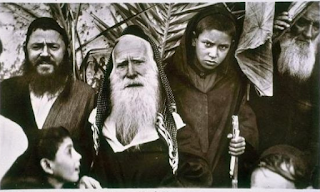
A few weeks ago, Abraham Elarar, head of the Canadian Sephardi Federation wrote in Canadian Jewish News that Moroccan Jews left their country of birth out of Zionism. Those who did not go to Israel could not possibly be refugees, since they still have links with Morocco (but Jews who fled Nazi Germany might still have links with Germany. It is true that Morocco did not strip Jews of their citizenship, but it still criminalised Zionism, with all that entailed.)
Jews in Morocco
Of the 856,000 Jews who lived in Arab countries and Iran, over 257,000 – 30 per cent – lived in Morocco. There, already before the bitter experience with the Vichy period of the French protectorate, a growing segment of pro-Zionist youths had already begun to engage in tsiyonut magshima – active Zionism leading to aliyah. In his book, North African Jewry In The Twentieth Century, Michael Laskier notes that the Charles Netter Association was transformed into an important Zionist organization operated in Morocco from the late 1920s. (…)
In spite of Morocco’s reluctance under the French protectorate to allow a mass emigration of its Jewish subjects, and later the reassurances by Balafrej and the king’s declaration, 108,000 Jews made aliyah between 1948 and Morocco’s independence in 1956.
According to Israeli historian Yigal Ben-Nun, 237,800 Jews immigrated to Israel from Morocco between 1948 and 1967. Most did so out of a strong Zionist conviction, while the others longed for better economic conditions. To claim, however, that the Moroccan Jews who made aliyah were refugees denigrates them by distorting the historical facts and denies that they were ardent Zionists.
As for the other 20,000 Moroccan Jews who immigrated to France and Canada, where they established thriving communities, it would be likewise preposterous to call them refugees, especially since many continue to maintain strong economic, cultural and academic ties with Morocco. Indeed, unlike other countries, Morocco has never stripped its Jewish citizens of their citizenship.
Read article in full and see comment by Davka
For a comprehensive response, see this piece by Modgador-born Professor David Bensoussan, a former president of the Communauté Sépharade Unifiée du Québec :
Were Moroccan Jews refugees in the same way as Jews from Egypt, driven out in 24 hours, or Jews from Iraq or Libya, who were subject to massacre?
What is the definition of a refugee? The Jews of Morocco were not war refugees, but a set of conditions prevailed which meant that they could no longer see their future in the land of their birth. This best describes the situation of the Jews of Morocco. That said, in 1948, there were massacres at Ouijda and Zellidja. There were other isolated incidents, but the persecution was not on the scale of Iraq, for instance.
What caused the exodus of the Jews of Morocco?
There was a feeling of liberation with the establishment of the state of Israel. There was also the fear, after the French left in 1956, that the condition of pre-Protectorate insecurity would return. Many thought by emigrating to Europe or the US they could improve their socio-economic circumstances. There was also the tragic issue of forced conversions of young Jewish girls in the early 1960s. At the same time, Morocco aligned itself with the radical stance of the Arab League, spreading a definite ‘malaise’ among the Jews of Morocco, which became more serious owing to the repercussions of the Arab-Israeli conflict. All these factors forced them to leave.
How much of the emigration of the Jews of Morocco was influenced by the attraction of the Jewish state?Many saw the rebirth of the state of Israel as a messianic event marking the end of exile and its torments and the beginning of redemption. Their identification with the Judean motherland over the millennia had not dimmed; Jewish liturgy identified the return to Zion with the end of Humiliation. Jewish life on Moroccan soil certainly had its great peaks of symbiosis, but also troughs of great distress. Although many Jews served their rulers loyally, the great mass of people endured difficult conditions, and not only in times of crisis. But pride in the rebirth of the Jewish state was a feeling shared by many Jewish communities throughout the world, without their witnessing a massive exodus.

Leave a Reply